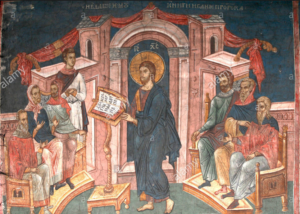Christ preaching in the synagogue at Nazareth (c. 1350)
Mount Calvary
A Roman Catholic Parish
The Ordinariate of the Chair of S. Peter
Eutaw Street and Madison Avenue
Baltimore, Maryland
Rev. Albert Scharbach, Pastor
Dr Allen Buskirk, Choirmaster
10:00 AM Sung Mass
Epiphany III
_________________
Common
An Anglican Folk Mass, Martin Shaw
_________________
Anthems
William Byrd (1540–1623)
Surge, illuminare Jerusalem: quia venit lumen tuum, et gloria Domini super te orta est. Alleluia.
Arise, be enlightened, O Jerusalem: for thy light is come, and the glory of the Lord is risen upon thee.
Here sung in concert by the Chorus Angelorum.
__________
Orlando Gibbons (1583–1625)
Almighty and everlasting God, mercifully look upon our infirmities, and in all our dangers and necessities stretch forth thy right hand to help and defend us, through Christ our Lord. Amen.
Here is the Choir of Magdalen College, Oxford.
__________________
Hymns
Hark! The glad sound, the Saviour comes (BRISTOL) is by the Scots Dissenter Philip Doddridge (1702—1751). The hymn follows closely the scriptural account of Jesus’ preaching in the synagogue, especially in verse 3 of the usual text: “he hath sent me to heal the broken-hearted, to preach deliverance to the captives, and recovering of sight to the blind, to set at liberty them that are bruised, to preach the acceptable year of the Lord.” Doddridge composed all his hymns to repeat and reinforce the text on which he was preaching.
__________
Wherefore, O Father, we thy humble servants, by the Anglican clergyman William Henry Hammond Jervois (1852–1905), is a short hymn for Holy Communion, based on part of the first prayer after Communion in the Book of Common Prayer: ‘O Lord and heavenly Father, we thy humble servants entirely desire thy fatherly goodness mercifully to accept this our sacrifice of praise and thanksgiving;…’ The hymn emphasizes that the sacrifice we offer is Christ Himself, and in Him we pray for the living and the dead.
The tune LOBET DEN HERRN is by Johann Crüger (1598–1662).
__________
Hail to the Lord’s Anointed (WOODBIRD) is by James Montgomery, (1771–1854) for a Moravian occasion. It is a free paraphrase of Psalm 72, a psalm of righteousness and justice. It combines the recognition of the coming of Christ to the Gentiles with Montgomery’s great interest in missionary work. Indeed, shortly after its composition a copy of the hymn was sent in January 1822 to his friend George Bennet, who was on a long journey in the Far East and the Pacific Islands to visit the mission stations there.
WOODBIRD is ES FLOG EIN KLEINS WALDVOGELEIN, a German folk tune, first published in an early-seventeenth-century manuscript collection from Memmingen, Germany. Its bar-form structure is (AABA’).
